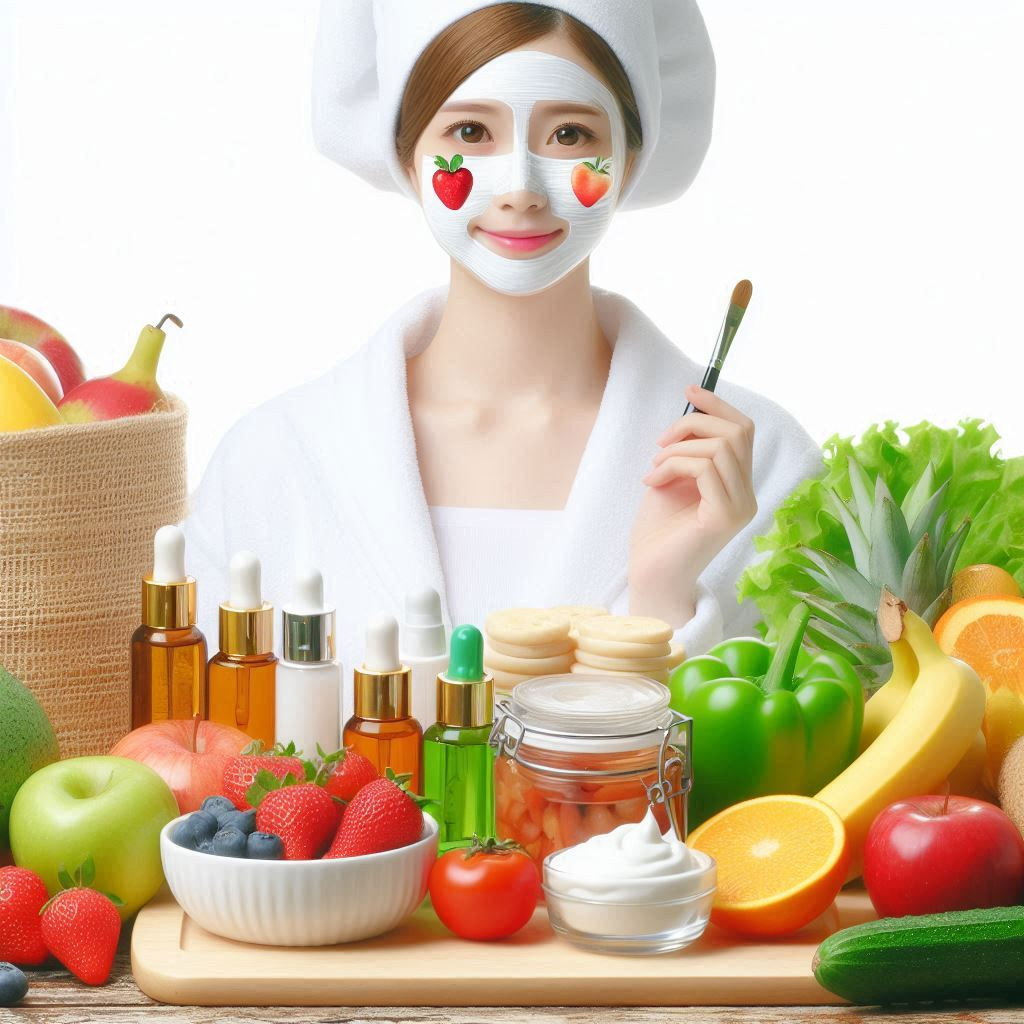
Skin, Health & Nutrition Nourishing skin from within
Skin care nourishing through diet involves consuming specific foods and nutrients that support skin health and enhance its appearance from the inside out. Here’s a detailed look at how diet can contribute to nourishing your skin:
Antioxidants
Antioxidants help protect skin cells from damage caused by free radicals, which can lead to premature aging and skin issues.
- Vitamin C: Found in citrus fruits (oranges, grapefruits), strawberries, bell peppers, and broccoli. It helps with collagen production and skin repair.
- Vitamin E: Present in nuts, seeds, and green leafy vegetables. It helps protect skin cells from oxidative stress and supports skin hydration.

Healthy Fats
Healthy fats help maintain the skin’s lipid barrier, which keeps moisture in and irritants out.
- Omega-3 Fatty Acids: Found in fatty fish (salmon, mackerel), flaxseeds, chia seeds, and walnuts. Omega-3s help reduce inflammation and support skin hydration.
- Monounsaturated Fats: Present in avocados, olive oil, and nuts. These fats help maintain skin elasticity and hydration.
Collagen Boosters
Collagen is a protein that maintains skin elasticity and firmness.
- Bone Broth: A source of collagen that can help support skin health.
- Protein-Rich Foods: Foods like lean meats, poultry, and legumes provide amino acids necessary for collagen production.
- Vitamin C-Rich Foods: As mentioned earlier, vitamin C helps in the synthesis of collagen.
1. Hydration
- Water: Staying well-hydrated is crucial. Aim for at least 8 glasses of water a day. Proper hydration helps maintain skin elasticity and moisture.
- Herbal Teas: Green tea and other herbal teas can provide antioxidants and hydration.
2. Balanced Diet

- Fruits and Vegetables: Incorporate a variety of colorful fruits and veggies, which are rich in vitamins, minerals, and antioxidants. Vitamin C (found in oranges, strawberries, and bell peppers) helps with collagen production, while beta-carotene (found in carrots and sweet potatoes) supports skin health.
- Healthy Fats: Include sources of omega-3 fatty acids like salmon, chia seeds, flaxseeds, and walnuts. These fats help maintain the skin’s lipid barrier and reduce inflammation.
- Whole Grains: Opt for whole grains like quinoa, brown rice, and oats, which provide B vitamins that support skin health.
- Lean Proteins: Proteins like chicken, tofu, and legumes are important for repairing and building skin tissues.
3. Key Nutrients
- Vitamin E: Found in nuts, seeds, and green leafy vegetables, it helps protect the skin from oxidative damage.
- Zinc: Important for skin repair and inflammation control, zinc can be found in foods like beans, nuts, and whole grains.
- Collagen: This protein is crucial for skin elasticity. Bone broth and collagen supplements can be beneficial, along with vitamin C to support collagen synthesis.
4. Limit Processed Foods
- Sugar and Refined Carbs: High sugar and refined carbohydrate intake can lead to inflammation and skin issues like acne. Opt for whole foods instead.
5. Lifestyle Factors
- Stress Management: Chronic stress can negatively impact your skin. Practices like meditation, yoga, and deep breathing can help manage stress levels.
- Sleep: Aim for 7-9 hours of quality sleep per night. During sleep, your body repairs and regenerates skin cells.
6. Moderate Alcohol and Caffeine
- Excessive alcohol and caffeine can dehydrate the skin. Moderation is key, and be sure to compensate with plenty of water.

7. Exercise
- Regular physical activity increases blood flow, which helps deliver oxygen and nutrients to the skin and remove toxins.










